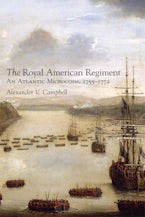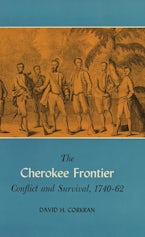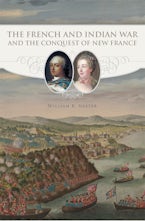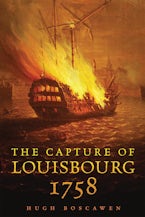HISTORY / United States / Colonial Period (1600-1775)
Showing results 1-10 of 12
Filter Results OPEN +

Killing over Land
Murder and Diplomacy on the Early American Frontier
Ultimately, what Owens analyzes in Killing over Land is nothing less than the commodification of human life in return for a sense of order—as defined and accepted, however differently, by both Native and white authorities as the contest for land and resources intensified in the European colonization of North America.
Rivers of Power
Creek Political Culture in the Native South, 1750–1815
Weaving a new narrative of the Creeks and outlining the contours of their riverine mode of governance, this work unpacks the fraught dimensions of political power in the Native South—and, indeed, Native North America—in the eighteenth and early nineteenth centuries. By privileging Indigenous thought and intertribal history, it also advances the larger project of Native American history.
Cherokee Power
Imperial and Indigenous Geopolitics in the Trans-Appalachian West, 1670–1774
In Cherokee Power, Kristofer Ray brings long-overdue clarity to this question by highlighting the role of the Overhill Cherokees in shaping imperial and Indigenous geopolitics in seventeenth- and eighteenth-century America.
Connecticut Unscathed
Victory in the Great Narragansett War, 1675–1676
The conflict that historians have called King Philip’s War still ranks as one of the bloodiest per capita in American history. An Indian coalition ravaged much of New England, killing six hundred colonial fighting men (not including their Indian allies), obliterating seventeen white towns, and damaging more than fifty settlements. The version of these events that has come down to us focuses on Plymouth and Massachusetts Bay—the colonies whose commentators dominated the storytelling. But because Connecticut lacked a chronicler, its experience has gone largely untold. As Jason Warren makes clear in Connecticut Unscathed, this imbalance has generated an incomplete narrative of the war.
Junípero Serra
California, Indians, and the Transformation of a Missionary
In Junípero Serra: California, Indians, and the Transformation of a Missionary, Beebe and Senkewicz focus on Serra’s religious identity and his relations with Native peoples. They intersperse their narrative with new and accessible translations of many of Serra’s letters and sermons, which allows his voice to be heard in a more direct and engaging fashion.
The Royal American Regiment
An Atlantic Microcosm, 1755–1772
In the wake of Braddock’s defeat at Fort Duquesne in 1755, the British army raised the 60th, or Royal American, Regiment of Foot to fight the French and Indian War. Each of the regiment’s four battalions saw action in pivotal battles throughout the conflict. And as Alexander Campbell shows, the inclusion of foreign mercenaries and immigrant colonists alongside British volunteers made the RAR a microcosm of the Atlantic world. Not just a potent, combat-ready force, it played a key role in trade, migration, Indian diplomacy, and settlement.
The Cherokee Frontier
Conflict and Survival, 1740–62
The story of Cherokee statesmanship in terms of Indian institutions provides fresh insight into this era of colonial and American Indian history.
The French and Indian War and the Conquest of New France
The French and Indian War was the world’s first truly global conflict. When the French lost to the British in 1763, they lost their North American empire along with most of their colonies in the Caribbean, India, and West Africa. In The French and Indian War and the Conquest of New France, the only comprehensive account from the French perspective, William R. Nester explains how and why the French were defeated. He explores the fascinating personalities and epic events that shaped French diplomacy, strategy, and tactics and determined North America’s destiny.
Miera y Pacheco
A Renaissance Spaniard in Eighteenth-Century New Mexico
In Miera y Pacheco, John L. Kessell explores each aspect of this Renaissance man’s life in the colony. Beginning with his marriage to the young descendant of a once-prominent New Mexican family, we see Miera transformed by his varied experiences into the quintessential Hispanic New Mexican. As he traveled to every corner of the colony and beyond, Miera gathered not only geographical, social, and political data but also invaluable information about the Southwest’s indigenous peoples. At the same time, Miera the artist was carving and painting statues and panels of the saints for the altar screens of the colony.
The Capture of Louisbourg, 1758
Boscawen, an experienced soldier and sailor, and a direct descendant of Admiral the Hon. Edward Boscawen, who commanded the Royal Navy fleet at Louisbourg, examines the pivotal 1758 Louisbourg campaign from both the British and French perspectives. Drawing on myriad primary sources, including previously unpublished correspondence, Boscawen also answers the question "What did the soldiers and sailors who fought there do all day?" The result is the most comprehensive history of this strategically important campaign ever written.

Killing over Land
Murder and Diplomacy on the Early American Frontier
Rivers of Power
Creek Political Culture in the Native South, 1750–1815
Cherokee Power
Imperial and Indigenous Geopolitics in the Trans-Appalachian West, 1670–1774
Connecticut Unscathed
Victory in the Great Narragansett War, 1675–1676
Junípero Serra
California, Indians, and the Transformation of a Missionary
The Royal American Regiment
An Atlantic Microcosm, 1755–1772
The Cherokee Frontier
Conflict and Survival, 1740–62
The French and Indian War and the Conquest of New France
The French and Indian War was the world’s first truly global conflict. When the French lost to the British in 1763, they lost their North American empire along with most of their colonies in the Caribbean, India, and West Africa. In The French and Indian War and the Conquest of New France, the only comprehensive account from the French perspective, William R. Nester explains how and why the French were defeated. He explores the fascinating personalities and epic events that shaped French diplomacy, strategy, and tactics and determined North America’s destiny.











